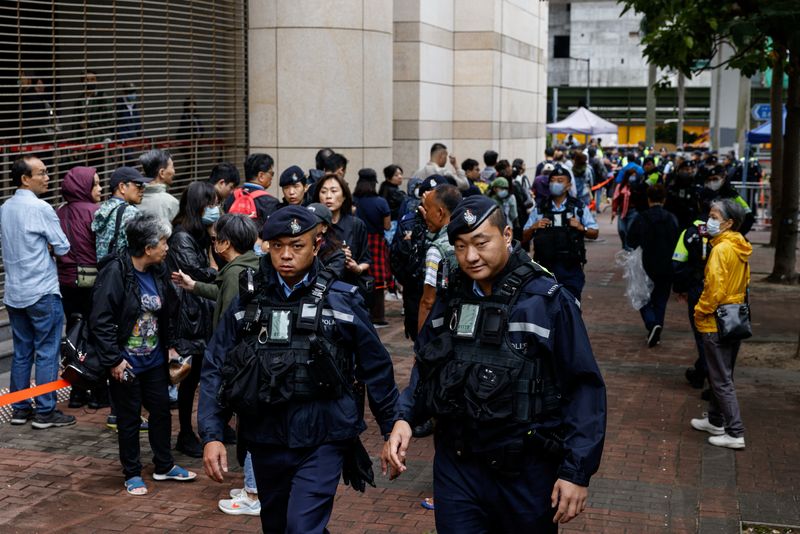‘Hong Kong 47’: Reaction to jailings of democrats in landmark national security trial

By Jessie Pang and James Pomfret
HONG KONG (Reuters) – Hong Kong’s High Court on Tuesday sentenced 45 leading democrats to jail terms of up to 10 years in what critics say is a major blow to the financial hub’s rule of law.
The following are comments on this landmark ruling:
REPUBLICAN CHRIS SMITH, CHAIRMAN OF THE U.S. CONGRESSIONAL-EXECUTIVE COMMISSION ON CHINA (CECC)
“The Hong Kong government is seeking U.S. investments in the very same week that it brutally silences free speech and jails pro-democracy advocates. The Chinese Communist Party is asking U.S. financial institutions to subsidize their repression in Hong Kong.
“Instead of investment, the Biden Administration must sanction the judges, police, and prosecutors engaged in the political prosecutions of the HK 47 (democrats) and Jimmy Lai.”
PENNY WONG, FOREIGN MINISTER OF AUSTRALIA
“The Australian Government is gravely concerned by the sentence handed down in Hong Kong for Australian citizen Mr Gordon Ng and other members of the NSL47.
“Australia has expressed our strong objections to the Chinese and Hong Kong authorities on the continuing broad application of national security legislation, including in application to Australian citizens.
“We call for China to cease suppression of freedoms of expression, assembly, media and civil society, consistent with the Human Rights Committee and Special Procedure recommendations, including the repeal of the National Security Law in Hong Kong.”
THE INTER-PARLIAMENTARY ALLIANCE ON CHINA (IPAC), A GROUP OF INTERNATIONAL LAWMAKERS ENGAGED IN ISSUES ON CHINA.
“(IPAC) denounce their convictions as a travesty of justice. These 45 men and women are suffering political persecution for organising a democratic primary election. This is clear evidence, if any more were needed, of the precipitous decline in the rule of law in Hong Kong. No credible system would countenance such ludicrously harsh sentences for people who merely wanted to vote.”
LEE YUE SHUN, 31, ONE OF THE TWO ACQUITTED DEMOCRATS:
“We should actively care to express our feelings, put forward our views, raise some questions or give some suggestions based on … the conclusion of this case. I think this is what everyone needs to do. Because as a member of society, these cases are not only about legal interests. In fact, everyone has a chance to be affected.”
SARAH BROOKS, CHINA DIRECTOR FOR AMNESTY INTERNATIONAL:
“We have moved into an era where healthy civic debate, the space for public discourse, and the normal interactions and sometimes frictions between civil societies and governments, is no longer seen as acceptable (in Hong Kong). That opposition is seen as dissent.”
STEVE TSANG, DIRECTOR OF THE CHINA INSTITUTE AT THE SCHOOL OF ORIENTAL AND AFRICAN STUDIES (SOAS) IN LONDON:
“Hong Kong’s democratic movement essentially has been put to a stop. It doesn’t mean that people in Hong Kong are not still aspiring for democracy. It doesn’t mean that there are no people in Hong Kong who would still fight for democracy. But as an organised movement, it has effectively been put to a stop.”
“The range of people who are being caught up in this network of 47 shows that even people who are known to be very, very moderate indeed can be caught in the net.”
URANIA CHIU, A DOCTORAL LEGAL RESEARCHER AT OXFORD UNIVERSITY:
“The sentencing outcomes will of course matter greatly to the defendant themselves as well as anyone who wishes to continue to participate in civil society in Hong Kong, as a benchmark for the number of years it could cost one for certain types of participation unwelcome under national security laws.
“But ultimately I think the damage to Hongkongers’ faith in the courts and the rule of law has already been done in how the case has been handled so far, in terms of the mass arrests, stringent bail requirements, and over 3.5 years of detention for some of the defendants.”
(Reporting by Jessie Pang, James Pomfret and Joyce Zhou; Editing by Lincoln Feast.)